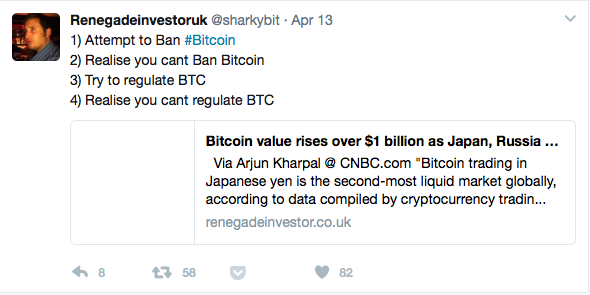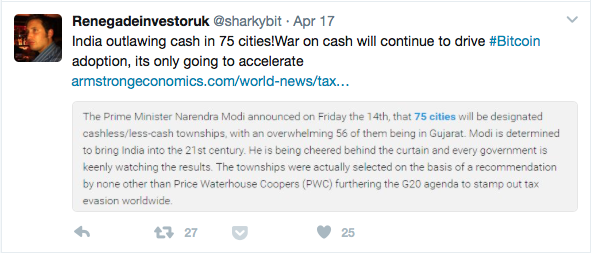As alluded to in my previous post The $5,000 Bitcoin: The Trends I have struggled to find any credible denunciations of Bitcoin.
As such I had the idea to email an old school mate to ask his opinion about Bitcoin. Intellectually he was light years ahead of any student or teacher throughout our high school years. Much of the content he would devise for our public speaking topics fell well beyond my understanding at the time – it probably still does!
His deep level of understanding in a variety of subjects, notably: politics, economics, current affairs and psychology, makes him the ideal person to ask about Bitcoin.
Furthermore, he currently works as a financial analyst in Connecticut, USA. So his professional expertise lie in finance and economics. His response to my request is copied below:
When it comes to Bitcoin, I’m by no means an expert on these matters and am operating with information that’s a couple years old in many cases so definitely don’t take my perspectives on this as the final matter. But I can venture an educated opinion:I looked into Bitcoin years ago when it first came to prominence and shot through $1,000. That was clearly a speculative bubble, which I got short of at the time. Subsequently though the Bitcoin financial system has weathered plenty of storms and is still alive and kicking so there’s an admirable robustness to it. In terms of the technical aspects, I’ve never really been 100% comfortable with my understanding of how it all works so for that reason alone I’ve been averse to being involved beyond my initial trader’s impulse to be short of the first bubble. From my understanding, it also seems that the Bitcoin financial system as a whole is far from being the kind of transparent, egalitarian endeavour it’s hyped as being. There’re plenty of shadowy insider cliques and unaccountable cartels effectively controlling the backbones of its architecture so to me it’s fundamentally not all that different to the pitfalls of government money.While I think it is a very intriguing conceptual basis for an alternative medium of exchange, the thing is also it’s currently not really used as a medium of exchange at all. It functions rather as a digital coupon that gets purchased with government money because it is able to represent value within the Bitcoin financial system that can be transferred much more quickly and discreetly than in the conventional financial system. But when all’s said and done one doesn’t want to keep value sitting in the Bitcoin itself because it is not generally acceptable for payment in the real world and its exchange rate is extremely volatile. The speed and discreetness attributes also mean it’s a magnet for illicit activities. Beyond the downright criminal, from figures I’ve seen the bulk of the trading volume in Bitcoin exchanges these days emanates from China as the populace there uses it to subvert capital and exchange controls.So there are additional layers of risk from the monopsony of Chinese participants and regulatory impediments. While governments are unlikely to be able to ever completely crush the Bitcoin financial system, they can make utilizing it much more onerous, risky and hamper the ability to exchange between their currencies. All of which bode ill for the Bitcoin itself to become a generally accepted medium of exchange, which is supposedly its ultimate appeal.
This is a very well presented substantiation for why he has chosen not to invest further in Bitcoin. His concerns are well founded and they bring up many of the most common concerns that prevent Bitcoin adoption. I have highlight 3 statements that I would like to comment on and attempt to refute.
“… the Bitcoin financial system as a whole is far from being the kind of transparent, egalitarian endeavour it’s hyped as being. There’re plenty of shadowy insider cliques and unaccountable cartels effectively controlling the backbones of its architecture …”
Bitcoin is a completely open-source project. The source code of Bitcoin is openly available for anyone to see. Developers are free to contribute to Bitcoin and also to develop their own software which interacts directly with the Bitcoin Blockchain (this is how wallets, exchanges, payment processors and various other applications are created to work with Bitcoin). It is 100% transparent. If it was not a fair, egalitarian system with a strict impenetrable protocol then Bitcoin would’ve started and ended with Satoshi Nakamoto. If it were flawed the second adopter would not have joined, neither the third, and so on… But today Bitcoin has millions of users worldwide and is worth over $20 Billion.
However, there is substance to this concern. A system which is 100% decentralized would imply that every participant is equally responsible for maintaining the Blockchain. This is not true with Bitcoin. Whilst Bitcoin has achieved an incredible organic growth and, is the most decentralized man-made system ever created, certain participants hold more power than others. A simple wallet user of Bitcoin does not have as much voting power as a full node, who does not have as much voting power as a miner.
It must also be conceded that a large amount of mining power can be centralized to certain degrees. Opposing camps in the mining community (re: scalability upgrades to the network) is the root cause of the tension which has permeated the Bitcoin community recently.
Below is a snapshot of the % of blocks mined by the various mining pools. This is approximately equal to the hashrate (mining power) produced by each pool.
It is worth investigating how scalability has been debated in the public. It is also important to understand the procedures that are followed by the community when considering new proposals for the network. So, while Bitcoin may not have achieved 100% decentralization, it is by far the most democratic financial system in the world.
“… it is not generally acceptable for payment in the real world and its exchange rate is extremely volatile.”

It is true that Bitcoin currently has a low liquidity when compared to the USD/EUR/GBP. Compared to other local currencies which are mostly limited to use within local borders, it can be argued that Bitcoin is more widely accepted.
I do concede that Bitcoin is extremely volatile. This is to be expected from, firstly, a revolutionary new technology and, secondly, from an infant currency.
Below is the lifetime volatility of Bitcoin, compared to the volatility of the South African Rand to offer context. It should be noted that the trend-line for Bitcoin is downwards.
Volatility is high, and general acceptance is low. But, both are trending in the opposite direction which bodes very well for the long term strength of Bitcoin. Vinny Lingham offers the best analysis for how Bitcoin will grow into a global currency.

You can read Vinny’s full article here.
“While governments are unlikely to be able to ever completely crush the Bitcoin financial system, they can make utilizing it much more onerous, risky and hamper the ability to exchange between their currencies.”
I cannot discredit this statement whatsoever – because I completely agree. Governments and finance houses will do their utmost to hinder Bitcoin and Crypto adoption.
It’s interesting to note though: If it was possible to ban, regulate or control Bitcoin, wouldn’t the major powers have done so already?

Blockchain’s decentralized, predominantly anonymous network makes this impossible to do. Hence, they will resort to controlling the other mechanism which we depend on – our fiat currency. Without the ability or infrastructure to mine Bitcoin, and falling short of being able to earn salaries (or income for goods/services) in Bitcoin, our only other method of accumulating Bitcoin is by purchasing with fiat currency. All exchanges are vulnerable to government interference, especially those which are not cash based. Most exchanges operate as legitimate businesses and as such are required to comply to local laws, specifically KYC and AML. Furthermore, governments and banks can also control our access to cash.

Finally, I would like to thank my old friend for taking the time to offer me his opinion. Opposing views are often more important to consider than those which reinforce our present-held beliefs. It prevents blind bias and forces us to critically assess the merits of our personal truths.




Nobody can be 100% certain as to what is going to happen with these technologies in general. So I would say statements like”it is not acceptable for payment in the real world” are invalid, as these technologies are still in their infancy. Depending on the total value of btc, isn’t it fair to say that it could sustain, or at the bare minimum supplement economies? Meaning that, theoretically, it isn’t beyond the realm of possibility that we could go from buying pizza in btc, to potentially buying real estate.
Moreover, innovation theory points towards the significance of product and process innovation, and the tensions related with the general acceptance of these innovations. Introducing new commodities/technologies that are qualitatively better versions of existing ones will always be followed by a period of uncertainty. Antonopoulos highlights that it took 40 years for people to accept credit cards as a form of payment. Prior to that it took 500 years before the widespread acceptance of notes, as a store of value. Bitcoin will most probably be widely accepted within 20 years.
LikeLike
I would challenge the notion of bitcoin’s volatility. Sure, bitcoin is volatile at the moment, however the price of any asset is subject to the laws of demand and supply. This suggests that as the market cap of the asset increases, single buy/sell transactions will have less of an impact on the actual price of bitcoin. The decreasing trends of Bitcoin volatility is evidence of this.
It should also be noted that: (1)fiat currencies themselves experience periods of major instability, particularly as governments print money out of thin air (2) If you view btc as a long term store of value, then short term volatility is insignificant. It should be judged by the estimated/predicted price cap at future points in time.
LikeLike
In reply to “Friend’s” opinion and the James Twiss article.
The fundamental weakness of all fiat currencies is that they are issued and controlled by a central bank and central banks work at the behest of the government that is in power, despite attempts to make them independent. This means that governments will print money for political gain and this has happened with every empire and every currency throughout history, resulting the diminution of that currency which coincides with the diminution of military power.
The dominant currency is obviously the US$ and it is common cause that the USA is bankrupt and only maintains its dominance through military power. The demand for dollars as a store of value and safe haven is forcefully imposed on the global economy. But how real is that demand and how much longer will it sustain?
The world is currently in the middle of a currency war. The first skirmishes were economic boycotts imposed against any country whose leader looked to challenge the all-powerful US$, namely, Iraq, Libya, Iran, …. and if economic sanctions did not succeed then military might was used to achieve the objective. The lie that these attacks are to bring democracy and human rights to the people of these counties is evidenced by the countries that commit equal or worse human rights violations and are anything but democracies that remain firm friends of the USA and are barely if ever criticised. i.e. Saudi Arabia, Burma, Israel and recent addition Turkey. Or you could look no further than the human rights atrocities that the USA has been committing for decades; Use of chemical weapons in every war since the Korean war, torture, bombing counties at will without a declaration of war resulting predominantly in the death of civilians, extrajudicial execution of its own citizens ……. In every one of these countries the wealth of the middle and working classes was stolen and transferred to the USA and its handpicked elite in those countries.
Phase two has been the obliteration of the economies of Greece, Cyprus, Venezuela, Argentina and soon India and once again the wealth of the middle and working classes was stolen and transferred to the USA and its handpicked elite in those countries. These were test cases that proved to be exceptionally effective and incurred absolutely no backlash of any significance.
The big battle currently underway, is between the US$ and the BRICS nations, mainly Russia and China. This is a battle the USA cannot afford to lose BUT inevitably will. History teaches us that currency wars lead to hot wars, and you can plainly see that USA is doing everything it can to create a “legitimate” justification for declaring war.
So what happens when empires go to war. They usually start the war with full coffers and at the end their coffers are completely depleted to the point where the public is no longer fooled into valuing the currency. Creating a vacuum for new empire to emerge. A hot war will make this bankruptcy apparent to the world resulting in them fleeing the US$. Where will people look to preserve their wealth? Gold and Bitcoin. I don’t believe that any fiat currency will be considered as a store of wealth this time.
So my conclusion is that human nature guarantees that the US$ will collapse and the only remaining question is when !!
LikeLike
I agree but would argue that rather than turn to gold, Bitcoin will be the choice of a safe haven store of wealth in the longer term. Why? When the US holds such huge stores of physical gold, they remain able to manipulate the market (aside from the other problems associated with holding a physical rather than digital asset).
My only question is this – what is stopping the US from turning all their resources to mining and collecting bitcoin to gain a sizable portion and have a much larger vote than others?
LikeLike
I recently received a second piece of Bitcoin denunciation. I disagree completely with the conclusions drawn, nonetheless, link provided for your consideration: https://www.linkedin.com/pulse/why-bitcoin-could-succeed-wont-james-twiss
LikeLike